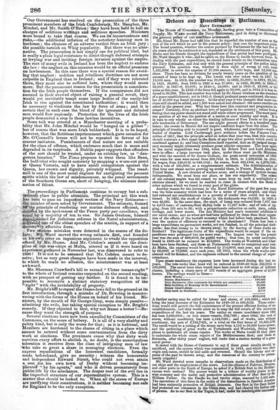The _proceedings ip Parliament continue to occupy but a sub-
Ordinate place in public attentio'n. The principal act this week ins been to pass an important section of the Navy Estimates— the number of men asked by Government. The estimate, framed tkp principle of rendering our marine defences efficient, and aged by the spokesmen of the Peace party par excellence, was fat,eisl. by a majority of ten to one. Sir James Graham himself shed for judicious reforms in the Naval administration, elrr«i one of the ablest speeches of the session, in support of a thorone ly effective force. Two cehrious mistakes were detected in the course of the de- bate. Werd moved the wrong estimate first, and founded on his owl error an ingenious argument to evade the opposition offered by Mr. Hume. And Mr. Cobden's assault on the disci- pline of our war-ships at Malta, uttered as if it were based on experience gathered in November last, was discovered to refer to 18361 It is not to be assumed that Mr. Cobden meant to de- ceive ; but as very great changes have been made in the interval, to which he made no allusion, the misstatement was at least awkward.
Mr. Sharman Crawford's bill to extend " Ulster tenant-right" to the whole of Ireland remains suspended on the second reading, with no prospect of getting any further. It is found to be im- possible to reconcile a distinct statutory recognition of the "right" with the inviolability of property. Mr. Bright's bill to repeal the Game-laws fell to the ground at its first introduction, through a mistake of Dr. Bowring in manceu- vering with the forms of the House on behalf of his friend. Mi- nisters, by the mouth of Sir George Grey, were simply passive— admitting the evils, but taking special exception to Mr. Bright's remedy. If they objected to that, why not frame a better ?—Be- cause they want the strength of purpose.
Several elections have now been annulled by Committees of the Commons, on the score of bribery. It is all of a very shabby and paltry kind, but is only the worse for that ; as it is habitual, and Members are hardened to the shame of sitting in a place which cannot be entered without some contamination from the dirty work at elections. The proximate cause why that dirty work survives every effort to abolish it, no doubt, is the unscrupulous toleration it receives from the class of intriguing men of law who take so great a share in managing elections. Even the express repudiations of the honestest candidates, formally made beforehand, give no security : witness the honourable and independent Edward Strutt, who could not even attain a seat for his own town of Derby without becoming im- plicated " by his agents," and who is driven prematurely from public life by the mischance. The deeper root of the evil lies in the imperfect structure of our representative system. This is a matter that should be looked to. When all the states of Europe are purifying their constitutions, it is neither becoming nor safe for England to be the only exception.


























 Previous page
Previous page